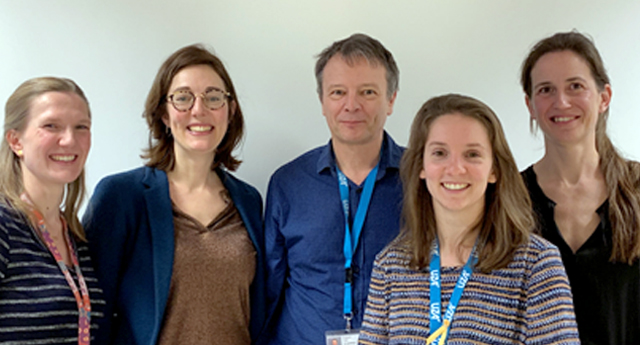Clinical Research Grant
The prize is awarded to non-commercial projects for clinical research in the field of cardiovascular pathology.
The research must be centred on the patients and aimed to determine the role of medication, intervention, diagnosis, symptoms or prevention in the physiological or pathological processes of the cardiovascular system.
2026 – Matthias Dupont - ZOL
STRIDE-CKM
2026 - Pasquale Scoppettuolo - Cliniques Universitaires Saint-Luc
New tools and predictors in prognostication of hypoxic-ischemic encephalopathy after OHCA
2026 - Emeline Van Craenenbroeck - UZA
EXCITE-HCM: Unravelling exercise-limiting factors in patients with obstructive HCM on contemporary therapy
2025 - Guido Claessen - UZ Leuven
Coronary plaque progression and the relationship with lipoprotein (a) and endurance exercise training
2025 – Sven Van Laer - University of Antwerp
Mitral valve regurgitation and its effect on thrombotic and bleeding risk in nonrheumatic atrial fibrillation
2025 - Jens-Uwe Voigt - UZ Leuven
Validation of Shear wave elastography using high frame rate imaging as a non-invasive tool for predicting elevated left ventricular filling pressures
2024 - Guido Claessen - UZ Leuven
Assessment of polygenic background to explain the association between small heart size and low cardiac fitness (GEN@HEART)
In GEN@HEART, we're studying how genes impact heart size, exercise capacity, and cardiac fitness. We're comparing highly trained athletes with those along the heart failure continuum. Despite similar exercise, some excel, others face heart issues. We suspect genes play a role. We aim to understand if specific genes related to heart size affect fitness. Studying 281 athletes and 312 heart failure patients, we'll explore this question and if certain genes could lead to better exercise responses.
2024 - Andreas Gevaert - UZA
ECSPAND: Exercise capacity improvement by Conduction System Pacing in heArt failure patieNts without compelling CRT inDication
In this randomized trial, we aim to evaluate the effect of novel conduction system pacing (CSP) versus conventional right ventricular apical pacing on exercise capacity in patients with heart failure (HF) and concomitant conduction system disorders. We hypothesize that CSP improves exercise capacity measured by peak oxygen uptake (VO2peak) as well as other markers of HF severity. The project will also provide deeper physiological insight into the mechanisms of VO2peak improvement by CSP.
2024 - Philip Moons - KU Leuven
Unraveling the role of retinal imaging as a clinical tool in evaluating accelerated aging in congenital heart disease
To date, most patients with congenital heart disease (CHD) can survive into adulthood. However, survivors often develop morbidities that suggest accelerated aging. We aim to quantify and understand disparities in chronological and biological age and to scrutinize the role of retinal imaging as clinical tool. We enrol 315 patients, in whom retinal fundus scan and biomarkers will be obtained. Predictors of aging are determined using medical records and a life history calendar .
2023 - Caroline Van De Heyning – Antwerp University Hospital
The value of 7-day rhythm surveillance as a novel tool for risk prediction in acute myocarditis
Acute myocarditis (AM) is an inflammatory heart disease. Symptoms vary from mild symptoms to heart failure and life-threatening arrhythmias. Sudden cardiac death (SCD) may occur up to years after initial presentation. To date, there are no reliable tools for SDC risk prediction or need for a prophylactic implantable cardioverter defibrillator. This project will evaluate the value of 7-day ECG monitoring for risk prediction in AM, comparing 24-hour Holter and cardiac magnetic resonance imaging.
2023 - Ines Joye - GZA vzw Ziekenhuizen
Cardiac stereotactic radiation treatment for the ablation of ventricular tachycardia
Ventricular tachycardia (VT) is a life-threatening condition, usually needing a implantable cardioverter defibrillator in combination with antiarrhytmic drugs and catheter ablation. However, not all patients benefit from these standard therapies. Within a multicentric study, we aim to determine the feasibility, safety and efficacy of cardiac stereotactic body irradiation for patients with ventricular tachycardia who are no (longer) candidates for standard therapies.
2023 - Constantijn Franssen - Antwerp University hospital
The incidence of cardiovascular events and revascularizations in patients treated with Immune Checkpoint Inhibitors in Belgium
Immune Checkpoint Inhibitors (ICI) have revolutionized cancer treatment. Recent reports suggest a threefold increased risk in acute coronary syndromes upon ICI treatment, which is relevant since indications increase. This project studies the Belgian situation, where 30000 patients received ICI treatment. Data will be provided by the Intermutualistisch Agentschap – Agence Intermutualiste (IMA-AIM), Statbel and the Belgian Cancer Registry and focus on revascularizations, and cardiovascular death.
2022 - Jan De Pooter – University Hospital of Gent
Conduction system pacing: a bench and bedside study. Insights in cardiac conduction disease translated to novel pacing strategies
2021 - Henri Gruwez - UZ Leuven
SURGICAL-AF 2 study: the clinical impact of remote heart rhythm monitoring by photoplethysmography-based smartphone technology in the rehabilitation after cardiac surgery. A randomized, open-label, multicenter, pragmatic clinical trial.
Atrial fibrillation (AF) is a cardiac arrythmia in which the atria of the heart (front chambers of the heart) lose their ability to contract in synchrony with the heart. This results in an irregular heartbeat. AF is the most common cardiac arrythmia and is important because it is associated with negative outcomes such as heart failure, stroke and mortality.
Up to 60% of patient who underwent cardiac surgery develop AF. Post-operative atrial fibrillation is known as POAF. Often this arrythmia occurs in episodes which start and cease spontaneously. These episodes can remain undetected as they are often asymptomatic. In hospital the heart rhythm is monitored for arrythmias. But to date there is no rhythm surveillance at home after discharge.
Rhythm surveillance after discharge from cardiac surgery will enable early POAF detection which leads to three major benefits. At first, patient with POAF can be treated with blood thinners to reduce stroke risk. Secondly, early detection of AF enables early rhythm control which is associated with superior outcomes. Thirdly, patients often develop POAF as a result of an underlying substrate. After cardiac surgery the underlying substrate is often a post-operative adverse event. By monitoring for POAF we will simultaneously be monitoring for post-operative adverse events enabling earlier detection and treatment of post-operative adverse events.
In the SURGICAL-AF 2 trial we will monitor the heart rhythm after discharge in patients who underwent cardiac bypass surgery or surgery of the heart valves. Monitoring will be performed using a smartphone application. The patient can analyze his or her heart rhythm simply by placing a finger on the smartphone camera. An automatic algorithm will provide feedback to the patient. When an abnormal rhythm is detected an early follow up visit shall be organized. This surveillance strategy provides a reliable, patient centred and cost-effective post-operative rhythm monitoring for POAF.
The SURGICAL-AF 2 study will evaluate if post-operative rhythm monitoring is better than the classical follow-up. It investigates the incidence of POAF and the effect of POAF surveillance on therapy changes, readmissions and healthcare related quality of life. It the SURGICAL-AF 2 trial is successful, the study will also investigate a potential effect on long term stroke occurrence and mortality.

Henri Gruwez
2020 - An Van Berendoncks - UAntwerpen
Prevention of recurrence of hypertensive pregnancy disorders in women with active desire for pregnancy, a randomized controlled trial: a smartphone-based aerobic exercise training program during pregnancy versus usual care
Preeclampsia (PE) is characterized by hypertension and organ-damage during pregnancy. Moreover, it has been shown that PE is a systemic disease affecting blood vessel function in the whole body with considerable risk for future cardiovascular disease. Therefore, there is a need for specialized Women’s Heart Clinics, where a multidisciplinary approach is adopted in the referral, diagnosis, treatment and follow-up of these patients. Currently, in PE patients, there is an unmet need of preventive measures to prevent 1) PE recurrence and 2) the development of cardiovascular disease later in life. With this project, we hypothesize that exercise training during pregnancy minimizes the risk of PE recurrence and long-term risk for cardiovascular disease through improved vascular health.

Team An Van Berendoncks

An Van Berendoncks